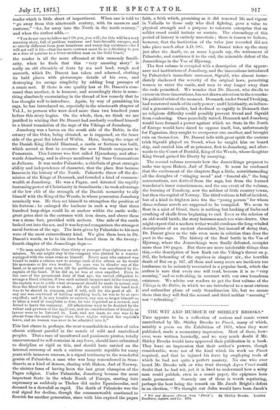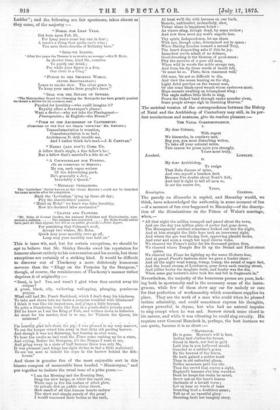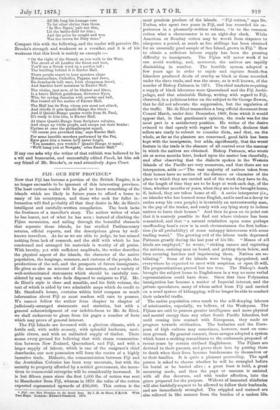THE WIT AND HUMOUR OF SHIRLEY BROOKS.* This appears to
be a collection of serious and comic verses contributed by Mr. Shirley Brooks to Punch, many of which, notably a poem on the Exhibition of 1851, when they were published, made a momentary impression. Most of them, how- ever, were written hurriedly, and we very much doubt if Mr. Shirley Brooks would have approved their publication in a book. They leave an impression that their author's powers, though considerable, were not of the kind which his work on Punch required, and that be injured his force by employing tools of which he had not quite a perfect mastery. No one who ever heard Mr. Brooks talk or who read through Aspen Court could doubt that he had wit, yet it is hard to understand how a witty man could publish, even in a comic paper, the epigrams here made permanent. Scarcely one of them is worth reprinting, perhaps the best being the remark on Mr. Jacob Bright's defeat in an election, "We thought our John would have been Jacob's "Piinch"). By Shirley Brooke. London
Ladder" ; and the following are fair specimens, taken almost as they come, of the majority :—
"MORAL FOR Lan. YEAR.
Get born upon Feb. 29, For Leap years come but one in four ; A toast's a thing that spoils one's wine ; You save three-fourths of birthday bore."
"SINK-WE SCENT°.
After live years the Thames is to receive no sewage."--But B. HALL.
In shorter time, kind Sir, contrive To purify our drink ; For while your figure is a five, Our river is a Cinq."
"Poxes TO THE SMOKING WORLD.
(AFTER HEADYKADELSY.)
Learn to smoke slow. The other grace is, To keep your smoke from people's faces."
"SEAL FOR THE SENATE OF SEWERS.
The Metropolitan Board for Cleansing the Metropolis has been greatly puzzled lie invent & device for its common seal.'
Puzzled for heraldry—who could imagine it? Royalty offers a Scavenger's plume :
Want a device—why not take the Plantagenet- flontagenisia ; in English—the Broom?"
"POEM BY THE ARCHBISHOP OF CANTERBURY.
(COMPOSED ON TRH DAY HIS GRACE .1311palVED' MR. DENISON.)
Transubstantiation is vexation, Consubstantiation is as bad ; Archdeacon D. doth trouble me,
And I rather think he's mad.—J. B. Cayrusa."
"MARRY (AND DON'T) COME UP.
A fellow that's single, a fine fellow's he ; But a fellow that's married's a felo de se."
"A COUNTERBLAST FOR PUFFING. (YO BE COMMITTED TO MEMORY.)
My son, each rogue eschew Of the Advertising pack. He's generally a Jew, Invariably a Quack."
"METALLIC OPERATIONS.
The 'Leviathan ' (better known as the • Great Eastern ') could not be launched SOF NOM months after its completion.
Mark the 'Leviathan' lying up there all dry; Pity the shareholders' panics : Metal on Metal' we knew was false heraldry, Now it's declared false mechanics."
"LEAVES AND FLOWERS.
'Mr. Bohn, of Covent Garden, the eminent Publisher and Floriculturist, sum- moned a cabman. . . . . The cabman was convicted Mr. Bohn would rather
lave paid Lb than appear, but did so on public grounde—Police Report.
For punishing that Cabman's scoff, Accept two wishes, Mr. Bohn.
Quick may your monthly rows go off, Long may your monthly rose hold on."
'This is tame wit, and, but for certain exceptions, we should be .apt to believe that Mr. Shirley Brooke owed his reputation for humour almost entirely to his conversation and his novels, but those exceptions are certainly of a striking kind. It would be difficult to discover out of Thackeray a more deliciously humorous snorceau than the "Elegy on the Porpoise by the Sturgeon," -though, of course, the reminiscence of Thackeray's manner rather deprives it of originality :— " Dead, is he ? Yes, and wasn't I glad when they carried away his corpus? A great, black, oily, wallowing, wallopping, plunging, ponderous porpus. What call had Mr. Frank Dockland, which I don't deny his kindness, To take and shove into my basin a porpoise troubled with blindness? I think it was like his impudence, and p'raps a little beyond, To poke a blundering brute like that in a gentle-fish's private pond. Did he know as I am the King of Fish, and written down in histories As meat for his master, that is to say, for Victoria the Queen, his
mistress?
I'm heartily glad he's dead, the pig : I was pleased to my very marrow, To see the keeper wheel him away in that dirty old garding barrow. And though it was not flattering, last Sunday as ever were, To hear the swells as had read the Times come rushing up for a stare, And crying, Bother the Sturgeon, it's the Porpus I want to see, And going away in a state of huff because there was only Me, It was pleasant (and kings has right divine to feel a little malicious) To see 'em sent to behold his cops in the barrow behind the fish-
house."
And there is genuine fun of the most enjoyable sort in this bizarre compost of memorable lines headed "Mnemosyne," and put together to imitate the usual tone of a prize poem :— " I am the Morning and the Evening Star, Drag the slow barge, or whirl the rapid oar, While rapt in fire the realms of ether glow, Or private dirt on public virtue throw. How small of all that human hearts endure The short and simple annals of the pooal I -would commend their bodies to the rack,
At least we'll die with harness on our back. Remote, nnfriended, melancholy, slow, Virtue alone is happiness below : As vipers sting, though dead, by some review; And now thou seest my soul's angelic hue.
Thy spirit, Independence, let me share With eye, though calm, determined not to spare : When blazing London seemed a second Troy, The heart desponding asks if this be joy. Immodest words admit of no defence, Good-breeding is the blossom of good-sense: Pity the sorrows of a poor old man, When wild in woods the noble savage ran, And from his lip those words of insult fell, 'It must be so. Plato, thou reasonest well.'
Old man, 'tie not so difficult to die, And view the ocean leaning on the sky, Light Ariel perches on the vacant seat, Or else some black-eyed wench whose eyebrows meet.
Hope mounts exulting on triumphant wing : The eagle suffers little birds to sing, Pours the linked band through ranks asunder riven, Some people always sigh in thanking Heaven."
The metrical version of the correspondence between the Bishop of Natal and the Archbishop of Canterbury may still, in its per- fect succinctness and neatness, give its readers pleasure :-
ma NATAL CORRESPONDENCE.
I.
My dear Colenao, With regret We hierarchs, in conclave met, Beg you, you most disturbing writer, To take off your colonial mitre. This course we press upon you strongly,
Lambeth. Yours most truly, LONOLEY.
IL
My dear Archbishop,
To resign That Zulu diocese of mine, And own myself a heathen dark Because I've doubts about Noah's Ark, And feel it right to tell all men so, Is not the course for,
Yours,
Kensington. COLENSO.
The parody on Hiawatha is capital, and Macaulay would, we think, have acknowledged the authorship in flome moment of fun —if a moment of fun ever happened to Macaulay—of the descrip- tion of the illuminations on the Prince of Wales's marriage, when,— " All that night the million tramped and paced about the town,
And ere the day two million pints of porter had gone down.
The Horseguards' sentinel sometimes looked out into the night, And at him straight the little boys took an irreverent sight.
And where the gas was blaring best, approving plaudit broke,
And ever and anon a rough but loyal chorus woke.
We cheered the Prince's tailor for his thousand guinea fires, We cheered where Temple Bar lit up the Strand and Fleet-street spires.
We cheered the Times for lighting up the name ill-doers fear, And at proud Punch's lustrous show we gave a louder cheer:
And all the night went tramp, tramp, tramp, the sound of eager feet, And the broad stream of Londoners, pour down each roaring street, And jollier broke the laughter forth, and louder was the din,
When some gay lantern's sides took fire and fell in fragments in."
Nevertheless, the majority of the humorous poems are poor, lack- ing both in spontaneity and in the necessary sense of the ineon- gruous, while few of them show any ear for melody or care for that perfection of workmanship which sometimes supplies its place. They are the work of a man who could when he pleased imitate admirably, and could sometimes express his thoughts, always powerful, in rhyme, but who had no natural impulse to sing except when he was sad. Sorrow struck some chord in his nature, and while it was vibrating he could sing sweetly. His requiem over General Havelock is, perhaps, the best instance we can quote, because it is so short :—
44 HA
VELOCK.
He is gone. Heaven's will is best,
Indian turf o'erlies his breast. Ghoul in black, nor fool in gold Laid him in you hallowed mould. Guarded to a soldier's grave By the bravest of the brave, He bath gained a nobler tomb Than in old cathedral gloom. Nobler mourners paid the rite Than the crowd that craves a sight,
England's banners o'er him waved—
Dead he keeps the realm he saved. Strew not on the hero's hearse Garlands of a herald verse ; Let us hear no words of fame Sounding loud a deathless name ; Tell us of no vauntful glory Shouting forth her haughty story. All life long his homage rose To far other shrine than those. 'In Hoc Signo,' pale nor dim, Lit the battle-field for him ; And the prize he sought and won Was the crown for Duty done."
Compare this with the following, and the reader will perceive Mr. Brooks's strength and weakness as a versifier, and it is of his weakness that this book is mainly an example :—
" On the right of the Strand, as you walk to the West, The street of all London the finest and best, You'll see a Greek word on a portico tall : The building behind it is Exeter Hall.
There people resort to hear spouters abase Mohammedans, Catholics, Pagans, and Jews, Ex-drunkards talk cant, Irish clergymen brawl, And fanatics howl nonsense in Exeter Hall.
The victim, just now, of its blather and blare, Is a brave British gentleman, Governor Eyre, Who, for saving Jamaica with powder and ball, Has roused all the malice of Exeter HalL The Hall has its Pets, whom you must not attack, And chiefly it pets Quashi-Bungo the black : And if Quashi-Bungo quotes words from St. Paul, It's ready to kiss him, is Exeter Hall.
At times Quashi-Bungo from Scripture refrains, And chops up white people, and scoops out their brains : Uprises at once the philanthropist squall, 'Of course you provoked him,' says Exeter Hall.
For some horrible murders performed by the Pet, Eyre gave him a lesson he'll never forget, 'You monster, you wretch !' Quashi-Bungo to maul ; 'We'll hang you at Newgate,' cries Exeter Hall."
If any one asks why the writer of that rubbish was believed to be a wit and humotuist, and successfully edited Punch, let him ask any friend of Mr. Brooks's, or read attentively Aspen Court.




































 Previous page
Previous page